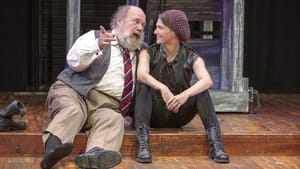Stay in the Loop
BSR publishes on a weekly schedule, with an email newsletter every Wednesday and Thursday morning. There’s no paywall, and subscribing is always free.
All hail the Henriad
The Pennsylvania Shakespeare Festival presents ‘Henry IV, Part 1’

The Pennsylvania Shakespeare Festival ended its 28th season with Henry IV, Part 1, the second play in the “Henriad” history cycle. Having usurped the crown from Richard II, Henry now fights off insurrections. But his party-hearty son, Prince Hal, just wants to hang out with Falstaff and his band of thieves at the Boar’s Head Tavern.
PSF continues its tradition of emulating Elizabethan theater for its final show of the season. Using “original practices,” actors who have already learned their lines rehearse for just a few days, ransack rival stages for clothes and props, then let it fly without benefit of a director. As you might expect, these shows tend to be loosey-goosey, fun affairs—playfully apt for light comedy, more problematic for a heavy hitter like Henry IV, Part 1.
Falstaff to the rescue
But PSF gets away with it, thanks largely to Broadway veteran John Ahlin. He played Falstaff at PSF in 2005 and inhabits the character inside and out—in line delivery, facial expression, stage movement, everything. Best of all, he connects with his troupe; thus, this ex tempore, actor-driven show has a de facto director.
Other actors stand out: John Keabler makes you feel for King Henry: weak, dying, and grieving over his wastrel son. Anthony Lawton captures the villainous Worcester perfectly, and PSF veteran Christopher Patrick Mullen shines as Douglas, the warrior Scot with telltale chinks in his bravery. Jane Ridley as Mistress Quickly and Brad DePlanche as Bardolph are funny, too, feeding off Falstaff’s comic energy.
The troupe improvises dramatic offstage sound—mostly pounding drums. There is also a touch of audience involvement, always with Falstaff. At one point he sees us as the thieves and fools he cons onto the Shrewsbury battlefield for slaughter. (I was ordered to “stop slouching.”)
Gender-neutral casting is now the norm in many Shakespeare productions. PSF chimes in, casting women (Mairin Lee and Kathryn Tkel) as Prince Hal and Hotspur. It always takes me extra time and energy to adjust to these choices, but things fall into place. Tkel has good insight into Hotspur, but Lee left me missing the early menace hiding inside the Hal/Falstaff relationship (the first time I saw this play, Prince Hal scared the pants off me).

Virtue on trial
I feel certain Shakespeare intended Falstaff to be just a rogue/fool character, until he saw the chance to use him as a way to challenge the presumptive virtue of glorious words like honor and duty. In writing one of the most protean characters in theatrical history, Shakespeare endows Falstaff with limitless wit and vitality, transforming a scoundrel into a loveable rogue.
The very existence of a “loveable scoundrel” puts virtue on trial. Falstaff finally makes the challenge explicit in his famous “honor” soliloquy. “Can honor set to a leg? No. Or take away the grief of a wound? No…. What is that 'honor'? Air. A trim reckoning…I’ll none of it.” (Do yourself a favor and read the full oration; it is magnificent.)
But Shakespeare puts Falstaff on trial, too. The truly honorable Hotspur does not die on the battlefield because of some dopey chivalry. As Kathryn Tkel makes clear, Hotspur would have accepted the king’s peace offer, but Worcester deceives Northumberland’s heir—just the sort of treachery that is habitual to Falstaff.
Royal nihilism
Praise to PFS for staging the “Henriad” plays, beginning last season with Richard II. I will never forget Christian Peter Coulson’s Richard, floating about the stage in white robes, trying to fend off post-medieval nihilism with high art and a supercilious remove.
And in Henry IV, Part 1, Shakespeare dwells on the interrogation of values long before poet-philosopher Friedrich Nietzsche (1844-1900) did. It’s amazing that, more than 400 years ago, the Bard laid bare core reasons for our foreboding today: a confusion of values and the failure to overcome nihilism.
What, When, Where
Henry IV, Part 1. By William Shakespeare. Through August 4, 2019, at the Schubert Theatre of the Pennsylvania Shakespeare Festival, 2755 Station Avenue, Center Valley, PA. (610) 282-WILL or pashakespeare.org.
PFS is a wheelchair-accessible venue. If you need wheelchair seating or other accommodations, call the box office for your tickets. Each performance offers assisted listening devices and large print programs. PSF can also offer Braille programs and free tactile tours of props and costumes prior to performances, with advance reservations.
Sign up for our newsletter
All of the week's new articles, all in one place. Sign up for the free weekly BSR newsletters, and don't miss a conversation.
 Hugh Hunter
Hugh Hunter